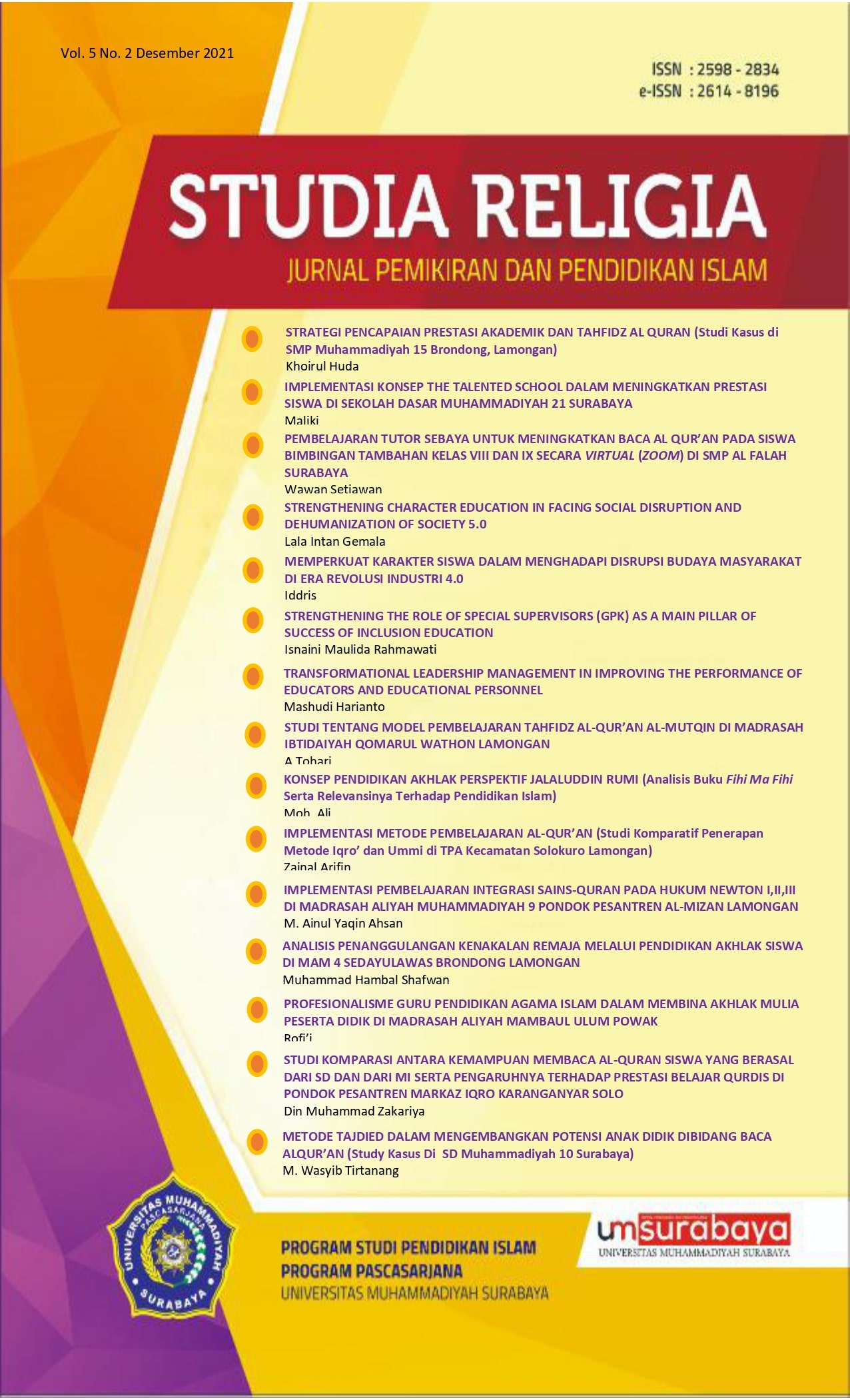STRENGTHENING CHARACTER EDUCATION IN FACING SOCIAL DISRUPTION AND DEHUMANIZATION OF SOCIETY 5.0
DOI:
https://doi.org/10.30651/sr.v5i2.10171Abstrak
This paper discusses the importance of character education for students in dealing with social disruption and dehumanization of society 5.0 . Around the 2010s the idea of the industrial revolution 4.0 was launched with intellectual engineering (artificia intelligence) and the internet of things as the main foothold for the connectivity of human life with machines. The main principle in this revolution is that it is easy, cheap, fast and accessible anywhere (simple, cheaper, faster and accessible). Therefore, the industrial revolution 4.0 is understood as a new civilization that will present opportunities for success as well as challenges for humans and their lives, especially the younger generation (millennials). ) as an agent of social change and a milestone in the history of his life. Digitization of information has provided very wide and even unlimited opportunities for every human being to access information and communicate and interact quickly and easily at a very low cost, so that slowly the industrial revolution 4.0 has fundamentally caused changes in mindset and behavior even identity as a human.Referensi
Ahmad Barizi (Ed). Integrative Education of Tradition Roots & Scientific Integration of Islamic Education. UIN-Maliki Press, Malang, 2011
Amir, T.M, Educational Innovation through Problem Based Learning: How Educators Empower Learners in the Knowledge Age. Kencana Prenada Media Group, Jakarta, 2009
Amri Rahman and Dulsukmi Kasim, Al-Qur'an-Based Character Education Efforts to Create a Characterized Nation, Jurnal al-Ulum Vol. 14 No. June 1 2014
Arfan Mu'ammar, Character Education: Internalization Strategies and Theoretical Studies, Raja Grafindo Persada, Jakarta, 2019
Azyumardi Azra, New Paradigm of National Education: Reconstruction and Democratization, Gramedia, Jakarta, 2018
Dasim Budimansyah, Character Education; Core Values for National Personality Development efforts. Widaya Aksara Press, Bandung, 2011
Daryanto. Education Evaluation. Rineka Cipta, Jakarta, 2012.
Ministry of Religion of the Republic of Indonesia. Al-Qur'an and its translation. Dipenogoro, Bandung, 2009
Doni Koesoema A., Character Education, Strategies for Educating Children in the Global Age, Kencana Prenada, Jakarta, 2013
Elmubarok, Z. Grounding Values Education. Alfabeta, Bandung, 2008
Fathul Mu'in, Character Education in Theoretical and Practical Construction. Ar-ruzz Media, Yogyakarta, 2011
Hamdani Rizal and Saifuddin Zuhri, al-Ghazali's Thoughts on Moral Education, in eprints.ums.ac.id
Irianto, D. Industry 4.0; The Challenges of Tomorrow. Presented at the National Seminar on Industrial Engineering, Batu-Malang, 2017
John M. Echols and Hasan Shadily, Indonesian English Dictionary, Gramedia, Jakarta, 1997
Kasali, Rhenald. Disruption “Nothing Can't Be Changed Before Dealing With Motivation Is Not Enough†Facing Invisible Opponents in Uber Civilization, PT Gramedia Pustaka Utama, Jakarta, 2018
Ministry of Religion of the Republic of Indonesia, Thematic Qur'an Interpretation, Character Development, and Human Resource Development, Research and Development and Training Agency, Jakarta, 2010
King, F.J., Goodson, L., & Rohani. Higher Order Thinking Skills. Center for Advancement of Learning and Assessment, 2006
M. Arifin, Islamic Education Science. Theoretical and Practical Overview Based on an Interdisciplinary Approach. Earth Literacy, Jakarta, 2006
Megawangi, Ratna. Character Parenting Space. Publishing House, Mizan, Bandung, 2007.
Minister of National Education. Law of the Republic of Indonesia No. 20 of 2003 concerning National Education System & Government Regulation of the Republic of Indonesia of 2010 concerning the Implementation of Education and Compulsory Education. Citra Umbara, Bandung, 2010
Moh. Zainal Fanani, Instilling Character Values Through the Development of School Culture†Tuban: Al Hikmah Journal, Volume 3, Number 2, September 2013
M. Quraish Shihab, Insights of the Qur'an: Thematic Interpretation of Various People's Issues, Mizan, Bandung, 1998
Muhaiman. Islamic Education Paradigm. Bandung: PT. Rosdakarya Youth 2012
Muhammad Ridwan Ashadi, "The Values of Character Education in Sirah Nabawiyah", Fak, Tarbiyah, Yogyakarta, 2004
Muhammad Nur Wangid, The Role of School Counselors in Character Education, Articles in the Horizon of Education (Yogyakarta: UNY, May 2010, Th. XXIX, Special Edition of UNY's Anniversary), p. 174-175
Mulyasa, Character Education Management, Earth Literacy, Jakarta, 2011
Nurcholish Madjid, Islamic Doctrine and Civilization, Paramadina, Jakarta, 1996
Nurcholish Madjid, Islam Religion of Humanity, Paramadina, Jakarta, 1995
Nurcholish Madjid, Islam Religion of Civilization, Paramadina, Jakarta, 1996
Ramli, T. Character Education, Gema Rosda Karya, Jakarta, 2003
Sasongko, R. N., & Sahono, B. School Management Innovation Design, Shany Publisher Saputro, Central Jakarta, 2016
Syafi'ie Ma'arif, Grounding Islam, Realities and Challenges of Islam in the Modern Era, Mizan, Bandung, 1996
Suparlan, How Important is Character Education and What Should We Do, in Suparlan.com published October 15, 2010
Siti Zubaidah, 21st Century Skills: Skills Taught Through Learning, Qpress, Jakarta, 2016
Drafting Team, Big Indonesian Dictionary, Balai Pustaka, Jakarta, 2008
Thomas Lickona, Character Education Complete Guide to Educating Students to Be Good and Smart, Nusa Media, Bandung, 2014
Ulil Amri Syafri, Al-Qur'an-Based Character Education, Raja Grafindo Persada, Bandung, 2014,
Zahrudin Ar and Hasanuddin Sinaga, Introduction to Moral Studies, Rajawali, Jakarta 2004
Zubaedi, Design of Conceptual Character Education and Its Application in Educational Institutions, Kencana, Jakarta, 2013
Unduhan
Diterbitkan
Terbitan
Bagian
Lisensi
Penulis tetap memegang hak atas karyanya dan memberikan hak publikasi pertama kepada jurnal ini yang secara simultan karya tersebut dilisensikan di bawah:
Creative Commons Attribution-NonCommercial 4.0 International License









